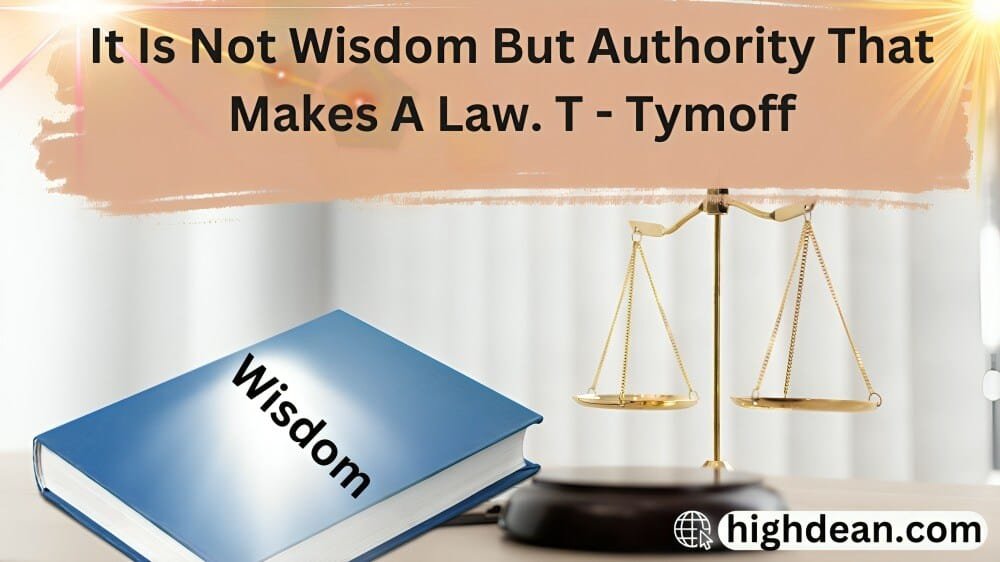In the context of legal frameworks and governing systems, decision-making and the proof of authority and wisdom in law-making manifest a crucial role in the institutional setting inside the society. The best statement over this interaction is summarily captured in Tymoff’s aggressive statement “it is not wisdom but authority that makes a law. t – tymoff. ” To understand the meaning of this quote, one comes to grasp the processes of imposing laws and implementing them, the effects of the desire or the reason in shaping laws, and the growth of legal science and jurisprudence.
However, the famous quote says: it is not wisdom but authority that makes a law. t – tymoff.
The Essence of Tymoff’s Insight
Ray Tymoff, an American playwright once said “it is not wisdom but authority that makes a law. t – tymoff” a statement that helps explain the given self-entailing proposition that the use of authority is what informs the creation of laws. The quote supports the authoritative role in the creation and lighting of laws pointing toward the source of legal power and the force behind legislative orders. Combined with other paradigms, it shapes millions of legal and governance frameworks around the world, which automatically creates the need to think about the significance and practical existence.
Authority Versus Wisdom in Modern Legal Systems
Consequently, it becomes important to determine concepts of authority and wisdom within the contemporary legal systems. While authority is given the mandate and structure for the formulation of laws, it would be devoid of sufficiency to formulate laws without the element of wisdom regarding the justice and sustainability of such laws to hearing clientele groups in society.
The Dilemma of Authority
Now that lawmaking is felt to be where most of the general authority resides, one can discern that too much power, untempered by wisdom, presents a quandary. For example, in a society or country, it is authority that provides the pinion of legitimacy and enforceability to laws yet, a castration of authority is likely to lead to a defeat of justice as well as social reality. The laws should not only follow orders of the authorities; they have to follow the nature of legitimacy that is to follow specific features of wisdom, justice, and the common interest. Accordingly, Tymoff’s insight chimes a bell in this respect and evokes the importance of being more wise on the link between authority and wisdom in the legislative sphere.
Embracing Wisdom in Lawmaking

In contrast to authority, Wisdom is at the center of making perpetual and rational laws. Therefore, Wisdom builds the laws into their context and introduces justice within them, as well as adds the element of acceptance of what is going to be considered for centuries thereafter. Therefore, in contrast with authority, which is added to the laws for completion, wisdom becomes an actualization that enriches the justice and durability of the law.
However, the enhancement of authority with wisdom promotes the possibility of a better understanding of the efficiency of the legal systems and produces fewer conflicting laws. The five tenets include assertive use of power and authority and gaining ideas from different people in the interest of making the right decisions explaining the flow of the transformation and development of the legal systems. In this connection, it is essential to strive for the desire, which embodies the idea of achieving a golden means to establish balance on the path of authority and wisdom; It is possible to create complex and fair rules that will prevent instability and disorder in society and positively impact the lives of the majority of the population.
Tymoff’s Insight in Historical Context
The truth has not been around for a while, and therefore the fact that Tymoff’s perspective brings all the timeframes together means that history embraces an ages-long timeless axiom. As it has been seen starting from the antique theology of Augustin and Thomas from Aquino’s politic science, which postulates the fear of the Lord as the archetypal element of politics, the mystery of authority and wisdom has interpellated, from antiquity up to the positivist and natural law theories which were born at the 17th and the 18th century.
The Moral Imperative
In other words, what it finally fell upon Tymoff to “it is not wisdom but authority that makes a law. t – tymoff” note is that what is shameful and regrettable is the fact that the process of lawmaking is yet incapable of making power and good sense agree with each other. Unfortunately, the rule that is dressed in the gown of proact has the necessity of authoritarianism as demanded by the rule of law and the welfare of society. Consequently, if these principles are promoted to reintroduce them side by side to support each other, then societies shall be in a position to develop the framework of legal structure which shall exist, enduring the need and time as well as, compatible with the society’s needs in the many different years of evolving society.
Contemporary Applications
Today, the statement “it is not wisdom but authority that makes a law. t – tymoff” by Tymoff refers to legal systems that require criticism and introduces the Enlightenment’s outlook on legal making. Rising from the relationship between global law and legal systems, modern legal issues such as contentious tribunals on the jurisprudence of a nation capture the dimension of change in the streams of legal thoughts between authority and wisdom and intensify the legal pluralism in creation and performance. This declaration from the mouth of Tymoff is symbolic of a light or lamp that guides or directs legal cognition and or operation in the continuously unfolding web of relations international.
Conclusion
Tymoff’s profound and contemplative outline of power and knowledge in the process of establishing laws shines a sharp, steady light into the sphere of legislation and governance. Applying Tymoff’s vision to address modern legal requirements, the insight establishes the criticality of returning to the process of envisioning more positive normative systems regarding fairness, stability, and justice embodying the meaning of the power/knowledge binary in balance.
FAQs
Answer- The quote is an indication that laws are dictated by authority, not by some sort of enlightened wisdom.
Answer- Power is needed to keep social systems working, cementing people’s obedience and ensuring compliance under a legal framework.
Answer- Wisdom enriches lawmaking by incorporating informed decisions, fairness, and long-term societal impact.
Answer- The balance ensures that the laws that are enacted are legitimate as well as just to receive mandatory support as well as adherence.
Answer- Focusing too much on authority risks bringing in oppressive laws while focusing on wisdom could hamper the enforceability of laws.
Also, Read About:-
